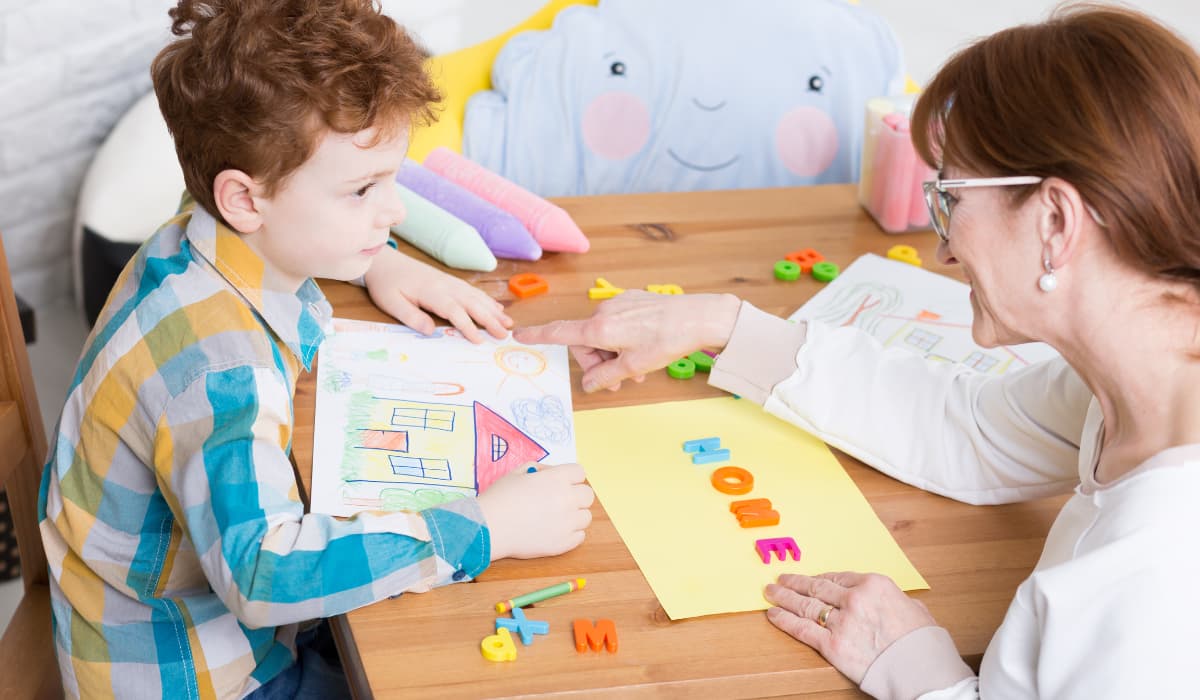School-Based Therapy vs. Clinic-Based: What Parents Should Know
When it comes to selecting the right Applied Behavior Analysis (ABA) therapy setting for your child, parents are often faced with an important decision: school-based therapy vs. clinic-based services.

When it comes to selecting the right Applied Behavior Analysis (ABA) therapy setting for your child, parents are often faced with an important decision: school-based therapy vs. clinic-based services. Both options offer distinct advantages, and understanding the differences can help you choose the setting that aligns best with your child’s individual needs, goals, and schedule.
Whether you're just beginning your journey or are evaluating current services, this comprehensive guide breaks down the key differences, benefits, and considerations to help parents make informed choices—especially for those seeking school-based therapy as part of their child’s support network.
What is School-Based Therapy?
School-based therapy refers to behavioral intervention services delivered directly in the school environment. These services are often coordinated between ABA providers and school personnel to integrate behavioral strategies into a child’s academic day. This approach allows therapists to support the child in real-time within the natural setting of their classroom, playground, or cafeteria.
The primary goal is to promote skill development that helps the child access their education more effectively while improving social interactions and reducing disruptive behaviors.
What is Clinic-Based ABA Therapy?
Clinic-based ABA therapy takes place in a structured clinical environment where Board-Certified Behavior Analysts (BCBAs) and Registered Behavior Technicians (RBTs) deliver one-on-one or small group interventions. Clinics are typically equipped with specialized tools, designated learning areas, and trained professionals who monitor and adjust programs consistently.
This setting provides more controlled conditions, which can be ideal for skill acquisition in areas like communication, play, and daily living skills.
Key Differences Between School-Based and Clinic-Based Therapy
1. Environment and Structure
- School-Based Therapy: Delivered in a natural, dynamic setting. Children learn in the same place they interact with peers and teachers. This environment allows for real-time intervention during real-world scenarios such as transitions between classes or lunchtime behavior.
- Clinic-Based Therapy: Offers a more structured environment that may limit distractions and allows for targeted, data-driven therapy. The clinical setting is often ideal for introducing new skills before generalizing them to other environments.
2. Therapy Goals
- School-Based: The focus is typically on functional behavior, classroom participation, academic readiness, and peer interactions. Therapy goals align closely with educational success and the student’s Individualized Education Program (IEP).
- Clinic-Based: Goals can range from daily living and communication to behavior reduction and advanced academic tasks. Clinics offer flexibility to pursue more intensive, customized treatment plans based on the child’s developmental stage.
3. Parent Involvement
- School-Based Therapy: Parent involvement may be limited since sessions occur during school hours. However, collaboration between therapists, teachers, and parents is essential for consistency across settings.
- Clinic-Based Therapy: Parents usually have greater opportunities to observe sessions, receive training, and participate in feedback sessions. This can strengthen carry-over of strategies into the home environment.
4. Access and Scheduling
- School-Based: Often integrated into the school day, reducing the need for after-school therapy sessions and minimizing transportation challenges. Coordination with school administrators is necessary to ensure smooth implementation.
- Clinic-Based: Typically requires scheduling outside school hours or partial school-day attendance. Families must manage commuting to the clinic, which may be a consideration based on proximity and availability.
5. Peer Interaction and Social Skills
- School-Based Therapy: Offers ample opportunities for organic social interaction and the chance to practice social skills in real time with classmates.
- Clinic-Based Therapy: Social skills groups may be available but are typically less spontaneous. However, these structured sessions can be valuable for targeted instruction.
Benefits of School-Based Therapy for Families
Parents considering school-based therapy should be aware of the many unique benefits:
- Real-Time Support: Challenges can be addressed as they happen, which helps therapists implement and reinforce strategies in real-life situations.
- Improved Educational Access: Therapy embedded in the school day supports academic engagement and reduces behavioral barriers to learning.
- Integrated Communication: Regular collaboration between school staff and ABA professionals allows for more cohesive and responsive plans.
- Less Scheduling Burden: Since therapy takes place during school hours, there’s often no need to adjust evening routines or extracurricular activities.
For families working with ABA providers Maryland, school-based services can ensure that therapy complements rather than competes with academic responsibilities.
Benefits of Clinic-Based ABA Therapy
While school-based therapy is highly effective, there are also strong reasons to consider clinic-based options:
- Intensive One-on-One Time: With fewer distractions, therapists can focus intensively on skill-building.
- Access to Specialized Equipment: Clinics often have tools and materials not available in school settings.
- Therapist Supervision: BCBAs are often on-site and directly involved in session planning, progress tracking, and team collaboration.
- Flexibility in Goal-Setting: Clinics may address a broader range of goals beyond those prioritized in school environments.
For families seeking aba services Maryland, choosing clinic-based therapy may be appropriate for children needing high-intensity intervention or those just beginning their ABA journey.
How to Choose the Right Setting
Every child is different, and choosing between school-based and clinic-based therapy depends on several individual factors. Here are some guiding questions to help:
- Where does your child face the most difficulty—at school, home, or in general social settings?
- Is your child able to generalize skills from one environment to another?
- What are your scheduling limitations and transportation access?
- How involved do you want to be in observing or participating in therapy sessions?
- Do your local ABA providers offer both options?
Some families even choose to combine both approaches—opting for school-based support during the academic year and clinic-based services during breaks or weekends.
Working with ABA Providers in Maryland
Maryland families have access to a variety of ABA professionals who offer both school-based and clinic-based services. It’s essential to work with providers who tailor their programs to your child’s needs and collaborate closely with schools to ensure a seamless support system.
Whether you're pursuing aba therapy for autism Maryland, or exploring ways to expand your child’s existing program, school-based therapy might be the missing link to help reinforce goals within the classroom.
At Big Dreamers ABA, we recognize the importance of flexibility and personalization in therapy delivery. That’s why we proudly offer comprehensive support in schools, clinics, and even in the home environment.
Final Thoughts: Finding the Right Fit
Choosing between school-based therapy and clinic-based therapy isn’t about deciding which is better universally—it’s about understanding which environment will help your child thrive.
- If your child benefits most from structured learning with individualized attention, clinic-based therapy may be the right fit.
- If your goal is to help your child succeed in the classroom and interact with peers effectively, school-based therapy offers a practical and beneficial setting.
Remember, the best therapy plan is one that evolves with your child’s progress, environment, and developmental goals. Open communication with your provider, school staff, and family is key to ensuring a coordinated, effective, and meaningful ABA experience.
About Us
At Big Dreamers ABA, we're committed to empowering children with autism to reach their fullest potential and lead fulfilling lives. We are a premier provider of ABA therapy services for children on the autism spectrum.
We proudly provide in-home, school-based, and center-based ABA therapy to support children diagnosed with autism who benefit from additional assistance. Our team works closely with families and educational institutions to ensure that therapy is consistent, collaborative, and truly centered on each child’s individual strengths and goals.
Whether you’re looking for clinic-based support or are exploring the advantages of school-based therapy, Big Dreamers ABA is here to guide your journey every step of the way.
FAQs
What is school-based therapy in ABA?
School-based therapy in ABA refers to behavioral therapy services delivered within a child’s school environment. These services are coordinated with school staff to support the child’s learning, behavior, and social development throughout the academic day. The therapy focuses on helping the child succeed in a natural setting where they interact with peers and teachers.
How does school-based therapy differ from clinic-based ABA therapy?
The key difference lies in the setting and structure. School-based therapy is integrated into the school routine, allowing real-time support during classroom activities. In contrast, clinic-based therapy takes place in a controlled environment with more intensive, individualized sessions. Both approaches are effective and can be tailored to a child’s specific needs.
What are the advantages of school-based therapy for children?
Some of the main benefits of school-based therapy include:
- Real-time behavioral support in a natural setting
- Improved social interactions with peers
- Integration with educational goals and IEPs
- Reduced burden on parents for transportation and after-school appointments
Can my child receive both school-based and clinic-based ABA therapy?
Yes, many families opt for a combination of both approaches. A child might receive school-based therapy during the day and attend clinic-based sessions after school or on weekends. This dual model can reinforce skill acquisition across different environments and provide well-rounded support.
Are school-based ABA services as effective as clinic-based therapy?
Effectiveness depends on the child’s goals and where they need support. School-based therapy is highly effective for promoting classroom behavior, peer interaction, and academic participation. Clinic-based therapy may be better suited for intensive skill-building or when introducing new behaviors in a distraction-free setting.
What should I look for in school-based ABA providers in Maryland?
Look for licensed and credentialed ABA providers Maryland who have experience working with school systems. They should offer transparent communication, align therapy goals with IEPs, and maintain regular collaboration with school staff and families. Also, ensure they have flexible service options, including in-home and clinic-based therapy.
How do ABA providers coordinate with schools to deliver school-based therapy?
Providers typically work closely with school teams, including teachers, special educators, and counselors. This may involve attending IEP meetings, setting shared goals, and observing the child in the classroom to tailor interventions that are practical and classroom-friendly.
Recent articles

In-Home ABA Therapy Towson MD | Personalized Autism Care

In-Home ABA Therapy Frederick MD: A Supportive Path to Meaningful Growth
